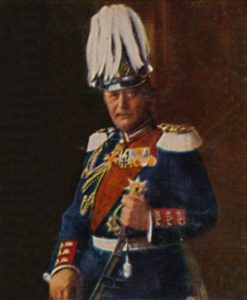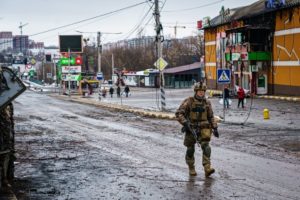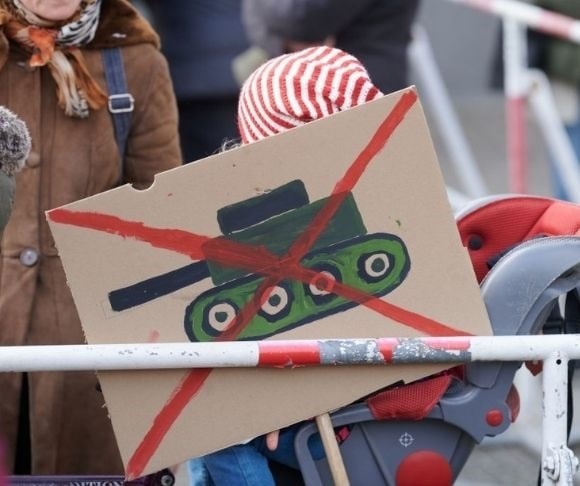As the situation in Ukraine continues, the big question stumping analysts and advisers is how the small, ragtag bunch of Ukrainian soldiers and citizens has not fallen before the might of the Russian army. In the world rankings of “available active military manpower,” Vladimir Putin’s forces come in at number two – just behind the United States – whereas Ukraine registers as number 22. And yet the plucky fighters seem to be giving the Kremlin more than a run for its money.
Part of this could be due to the home-field advantage; another aspect is that Russia does not have its full force engaged. But perhaps something else is at play.

German General Helmuth von Moltke (Photo by The Print Collector/Getty Images)
In the late 19th century, German General Helmuth von Moltke (the elder) revolutionized warfare with a simple principle known at the time as “Auftragstaktik.” It was the idea that fighters of all ranks should be able to operate independently of a central command and carry out their mission in a manner that reacts to the circumstances on the ground.
Moltke described the necessity for such, saying, “No plan of operations reaches with any certainty beyond the first encounter with the enemy’s main force.” What this means in practical terms is that soldiers given the objective are left to formulate their own tactics based on what they encounter during the mission.
Is this why Ukraine appears to be holding its own against the formidable power of Russia? Could it be that precisely because those opposing are not a coordinated force, they can wreak havoc and inflict damage on a level not possible while the enemy awaits precise orders from strategic command?
To examine this supposition, Liberty Nation spoke with military affairs correspondent, retired U.S. Air Force pilot, and former Principal Deputy Under Secretary of Defense Comptroller J. David Patterson.
Mark Angelides: Dave, in your analysis, could the idea of Auftragstaktik, or, as I believe it’s called in the U.S. military, “mission command,” be the reason that Ukraine is doing so well against the larger Russian force?
David Patterson: Auftragstaktik is more than a methodology for commanding troops in conflict. It’s really a “cultural philosophy,” and as such, “It is the highest form of professionalism. The overall commander’s intent is for the member to strive for professionalism, in return, the individual will be given latitude in the accomplishment of their given missions,” as Small Wars Journal explained. Effectively, what wins conflicts is having senior commanders establish the intent, or “why,” of the operation, allowing those on the front lines to execute the “how.”
Centralized command and decentralized execution are what we see in Ukraine. Probably not because it was planned, but because it is the result of necessity. The foot soldiers know what to do, and innately they understand why they are taking on the Russians, a force arguably better trained and equipped but slaves to higher command direction.
MA: Why would the Russians be relying on commands from Moscow? Is it possible that Vladimir Putin thought this invasion would be so fast that success would come almost immediately?
 JDP: In a totalitarian society, central authority is an identity with the reality of the government. It permeates the culture, especially the military, which one can argue is a captive audience. Disobedience is punished, and all too often innovative or creative thinking to solve battlefield circumstances is equated with insubordination or not following orders. In Russia, with few exceptions, autocratic thinking prevails. The despot calls the shots, and serfs execute. So, to your second question, Mark, Putin may have thought battlefield success would come quickly. If he did, that had more to do with his delusion that most Ukrainians would view the Russians as liberators rather than invaders.
JDP: In a totalitarian society, central authority is an identity with the reality of the government. It permeates the culture, especially the military, which one can argue is a captive audience. Disobedience is punished, and all too often innovative or creative thinking to solve battlefield circumstances is equated with insubordination or not following orders. In Russia, with few exceptions, autocratic thinking prevails. The despot calls the shots, and serfs execute. So, to your second question, Mark, Putin may have thought battlefield success would come quickly. If he did, that had more to do with his delusion that most Ukrainians would view the Russians as liberators rather than invaders.
MA: This idea of competitive strategies was used incredibly effectively by U.S. General David Petraeus in Mosul, Iraq, as regional commander. Can you tell us why this was so successful?
JDP: As I watched General Petraeus lead and manage the combat in and around Mosul, several things stood out. First, Petraeus did not spend all of his time in his headquarters. He was very much hands-on and spent a significant amount of his time out among the troops, not directing how they executed the mission but reinforcing the intent of the mission – why the soldiers were there. Secondly, Petraeus spent time with the Iraqis building confidence among the Iraqi military and civilian leadership that the U.S. was there to secure their immediate safety and ensure that security would last. Thirdly, by successfully achieving the first two, Petraeus defeated the emerging Sunni insurgency. Petraeus literally wrote the book on counterinsurgency: U.S. Army/Marine Corps Counterinsurgency Field Manual.
MA: Just one week into the Russian invasion, Ukrainian soldiers and citizens are clearly doing better than almost anyone – including Putin – would have expected. But is this mission command strategy likely to last long-term? What are the downsides of this in a prolonged operation?

(MARCUS YAM / LOS ANGELES TIMES)
JDP: The short answer, Mark, is yes. There is no alternative. As command intent becomes more distant in terms of ability to communicate between upper leadership and Ukrainian ground and air forces, responsibility for troops-in-contact decision-making will fall to lower echelons of unit leaders and fighters.
MA: What other factors contribute to Ukraine’s ability to hold out against the Russian troops?
JDP: There is no substitute for capable weapons and steadfast courage. Javelin anti-tank missiles and Stinger ground-to-air missiles have few equals.
The bravery of the Ukrainians to stand tall against the invaders with their tanks, missiles, and aircraft is rapidly becoming legendary. I’m reminded of the lone Chinese man in a white shirt and black pants carrying shopping bags standing in Tiananmen Square, stopping a tank bearing down on him. That’s courage. Now imagine an entire country of people displaying that level of bravery.
That’s Ukraine.
MA: Final question for you, Dave. Putting aside the political fallout, how does the situation on the ground – for the Ukrainian people – get resolved? Will Putin fight a war of attrition and keep going until there’s no one left to take up arms? Or will he settle for commanding key cities and then hit the negotiating table? How do you see it?
JDP: Without some significant intervention from a source not immediately apparent, Putin will drag his war on until there is no organized resistance. Putin will feign interest in truce talks, but his forces will keep the fight going in the meantime. To be serious about stopping the carnage that he started, the West will have to provide an offramp, giving Putin something. The challenge is giving Putin some face-saving appeasement while securing Ukraine’s security and sovereignty. Unfortunately, with Biden’s sanctions that do not include Russia’s petroleum revenue and not effective for 30 days, there is little hope that the monetary penalties will achieve an end to the fighting. At this moment, such an outcome does not seem possible.
~ Read more from Dave Patterson and Mark Angelides.




